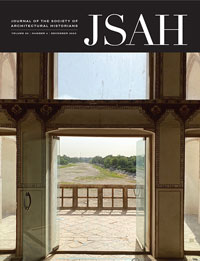At the Southeast Chapter of the Society of Architectural Historians (SESAH) annual conference earlier this month, Nathaniel Robert Walker, associate professor of architectural history, received the Best Book of the Year Award for his book, Victorian Visions of Suburban Utopia, Abandoning Babylon, beating authors from institutions like Duke University, University of Virginia and Vanderbilt University.
“In this prodigious study of architecture, literature and dreams, Nathaniel Walker takes his readers on a marvel-filled tour of Victorian visions of suburban Utopia and shows that the line dividing ‘real’ architecture and fantasy is thin indeed,” the 2021 SESAH Publication Awards Committee says. “Walker reviews a plethora of strange, wonderful and terrifying texts, images and buildings that represent the dreams of Utopian visionaries.”
In his book, Walker asks, “Why did we abandon our dense, complex urban places and seek to find ‘the best of the city and the country’ in the flowery suburbs?” The answer was 15 years in the making. In between teaching classes and advising students, Walker was researching the role of Utopian literature and science fiction in the demise of American cities. The persistence paid off in 2020 when Oxford University Press contacted Walker to discuss publishing his book.
“That alone was an honor,” says Walker, who calls Oxford his “dream publisher.”
He credits the College for supporting his efforts to present research at conferences, which he says has played a direct role in getting published, and he is grateful for the support he’s received from the Department of Art and Architectural History – especially from Marian Mazzone, associate professor and former chair, and Mary Beth Heston, chair – and from the retired and current deans of the School of the Arts, Valerie Morris and Edward Hart ’88, respectively. His student assistant, art history major Paige Miller ’21, was also a huge help.
Walker’s interest in the abandonment of American cities began during travels to Europe, when the walkable, historic cities of Paris and Berlin inspired him to question the history of urban disinvestment in cities like Nashville and Hartford.
“The desire for the destruction of dense, complex urbanism and its replacement with simpler, quieter and – above all – greener environs started with a hatred of London,” Walker says. “The vast slums of the city were all but uninhabitable by the 1500s – mired in disease, filth and poverty – and this hatred directly influenced the development of American communities.”
Fueled by well-known American and British authors like Edward Bellamy, Ebenezer Howard and H. G. Wells writing futuristic stories about high-tech, egalitarian, suburban communities, radical reformers issued a call to arms to abandon cities for a futuristic suburban Utopia.
“The consequences were profoundly mixed, as mechanized suburbs have had big downsides for our democracy, quality of life and environment,” says Walker.
He concludes: “If the Victorian utopian visionaries taught any lessons of enduring value, one of the most important may be that human dreams truly do have the power to reshape the world, even if the precise shape of those changes proves difficult to control.”
Nathaniel Walker joined SAH as a student in 2010, and ran the SAH listserv for several years. He served as a Conference speaker in 2016, 2018 and 2020, and as a session chair in 2019.


